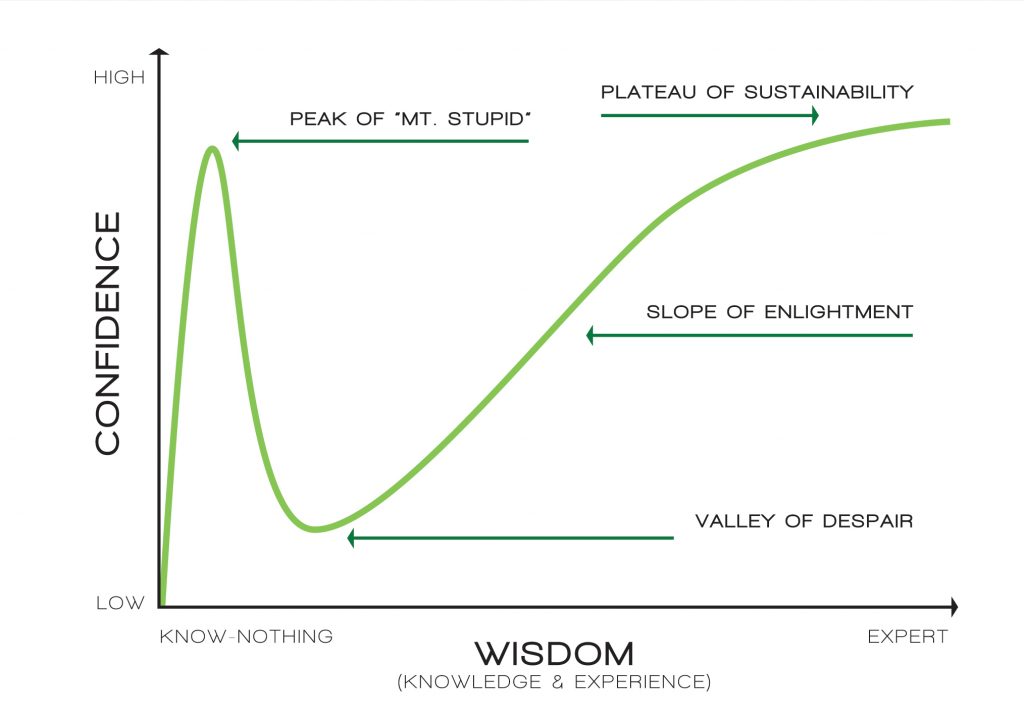Have you ever felt over inflated with knowledge in the initial days of your PhD, or any other long-duration course for that matter? Yes? What about the feeling that you know nothing as the veil of ignorance drops and reality hits you as time passes? Yes? If so, then this article is for you.
A PhD is generally a long journey (I say generally because there are some prodigies who are able to complete it well before their minds start realizing that they’re stuck), and like any other long journey, it has its own adventures. While most of us are quite aware of the common superficial kind of adventures encompassing a doctoral student’s life, we are generally unaware of the profound internal struggles and triumphs that unfold within their minds. With this article, I would like to draw attention to this important aspect of a student’s journey—the inner adventure through the lens of a famous cognitive effect proposed by Justin Kruger and David Dunning in 1999.
The Dunning-Kruger Effect is a cognitive bias in which individuals with low ability or knowledge in a particular domain may overestimate their competence, while those with high ability or knowledge may underestimate their competence. This effect has implications for people at various stages of their education, including those pursuing a PhD.
At the onset of their PhD journey, students are typically infused with passion and what some may term as overconfidence in their knowledge within their field. This overconfidence might hinder them from being open to divergent views when they surface: divergent simply because they do not tally with what the individual has already deemed correct. The misconception leading to this false sense of mastery over the topic area could be rooted in the feeling that one has more knowledge than an average person but yet not enough to fully grasp the intricacies entailed within it. In effect, students often start off with great faith in their ideas and approaches, coupled with overlooking challenges surrounding the voluminous work that still awaits them… only to awaken later to the reality.
As they progress further into their academic journey, doctoral students go deeper into their research, where they are typically blindsided by unforeseen challenges and intricacies. This epiphany often leads to a more realistic self-evaluation and acknowledgment of their limitations as students. The inflated feeling of self-worth is then replaced by a more realistic sense of humility; students begin to take stock of their abilities fairly accurately. They understand that it is more about leveraging their strength to position themselves into specific knowledge gaps. The learning process—which is inherently rigorous in a PhD program—helps them move from the “Mount Stupid” peak (high confidence but low competence) towards the “Valley of Reflection,” where their growing competence is accompanied by a realization of the vastness of what they don’t know and that there is an ocean of knowledge yet to be explored, which saves them from overconfidence. However, this phase is not one of despair but of critical growth, as students develop a more nuanced, balanced understanding of their expertise, equipping them to navigate their field with humility and mastery.
Understanding the Dunning-Kruger effect might assist those offering guidance to doctoral students. The Dunning-Kruger effect may be tackled by promoting a mindset of relentless learning and honest reflection among the students by encouraging them to perform self-assessments, engage in each other’s work for discussion and dialogue and, thus, bridging the gap between their self-understanding and the reality of affairs. Discussion among students at various levels of research also helps them learn about the ‘foolish’ choices generally made by beginners based on the unintended sense of overconfidence. Such mentorship from senior researchers and feedback from other scientists through interactions in conferences, etc. as well would enhance the ability to view oneself critically. Additionally, developing a mindset where achievement and IQ can be improved by work helps counterbalance one of the negatives of the Dunning-Kruger effect—rigidity of thinking. Gradually encouraging students to arrive at the solutions of problems by following important papers and collaborating with experts from other fields of study equips them with openness and willingness to learn new things. All of these strategies help doctoral students be critical of their knowledge, seek evaluation with the aim of improving and learn from others to eventually adjust their expectations accordingly, which would then facilitate their career development.
Conclusively, the relationship between pursuing a PhD and the Dunning-Kruger effect illustrates the evolving nature of self-assessment in the face of increasing knowledge and complexity. Early overconfidence often gives way to a more balanced and accurate self-view as students advance in their research, highlighting the importance of continuous learning and humility in the journey toward expertise.
Author: Sheo Rama
About the Author: Student of PHD 02
#DunningKrugerEffect #enlighteningiim #CriticalThinking
#ContinuousLearning #IIMBodhgaya #commsclub
#AcademicHumility #PhDJourney #AcademicLife
#LifelongLearning #SelfAssessment #iimbg



